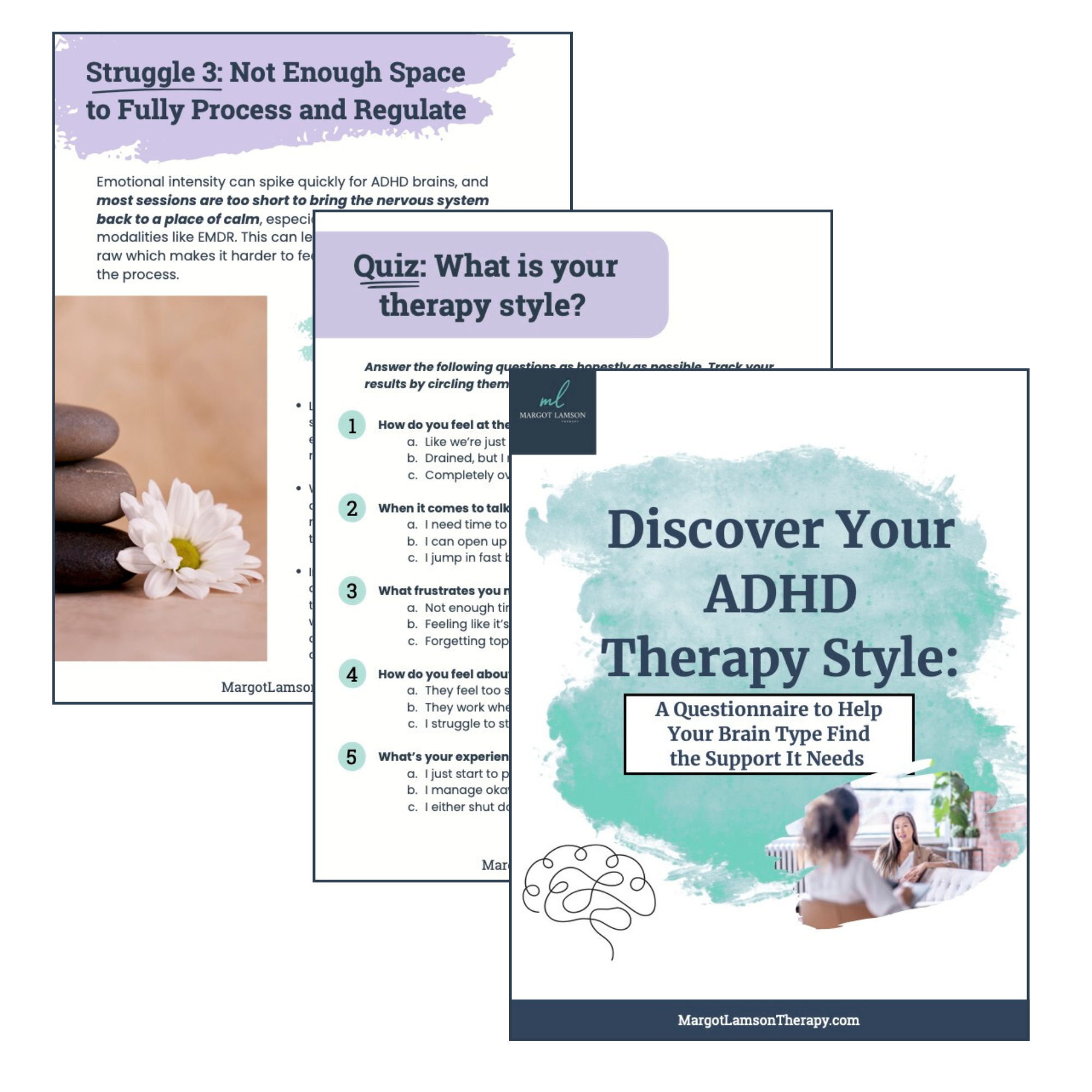
ADHD Support in Washington, D.C., Virginia & Maryland
Wondering if you have ADHD?
Maybe you’re not sure if you have ADHD. You could have taken one of those online tests and fallen into the ambiguous “you may have ADHD” category.
But you know it’s hard to stay focused and patient and sit for long periods. It may feel challenging to begin tasks or complete them. And then find yourself “procrastinating.”
Anxiety is resting on your shoulders, and that critical voice is getting louder: “Why can’t you do what you need to do? You are so lazy. What is wrong with you?”
Or, maybe you know that you have ADHD.
Perhaps you take medicine, and it helps. But you still feel like something is missing – like you still don’t have a handle on things. That unhelpful, critical voice keeps saying annoying stuff like, “Here you are again, putting things off. Some things never change.”
You feel like a failure or think you aren’t living up to your potential. Those thoughts get you down and make you wonder, “There must be something wrong with me.”
Perhaps you had a bad experience with medicine, or it’s not for you. You want to figure out how to manage your ADHD symptoms. You’ve had some success, but you think you could make things easier for yourself.
If any of that sounds familiar… you’re in the right place!
Why does ADHD feel so complicated?
-
ADHD (Attention-Deficit/Hyperactivity Disorder) is a neurodevelopmental condition that impacts focus, attention, and impulse control. It can affect your daily life in many ways, such as difficulty concentrating, staying organized, or managing time effectively. You might find yourself procrastinating, feeling overwhelmed by tasks, or struggling with impulsive decisions and emotional regulation. For some, ADHD can lead to self-criticism and frustration, making you feel like you're not living up to your potential. These challenges can impact your relationships, work, and overall well-being.
-
No, medication is not required to manage ADHD. While it can be helpful for many, therapy offers effective alternatives. I use evidence-based approaches, including mindfulness, cognitive strategies, and practical tools like creating routines, building habits, and forming accountability systems. My approach also incorporates relational trauma therapy to address self-doubt and perfectionism often linked to ADHD. Whether or not you choose medication, therapy can help you develop the skills and support needed to live a more balanced life.
-
ADHD and relational trauma can be closely connected. ADHD symptoms, like difficulty focusing, impulsivity, and emotional regulation challenges, can strain relationships and lead to feelings of rejection, isolation, or frustration. Relational trauma, such as emotional neglect, abandonment, or inconsistent caregiving, can amplify these struggles, creating a cycle where ADHD symptoms worsen the impact of past experiences, and past trauma exacerbates ADHD challenges. This can make everyday interactions feel overwhelming and leave you feeling misunderstood or stuck.
Addressing both ADHD and relational trauma in therapy helps build emotional resilience, enhance relationships, and foster self-understanding. By treating both aspects, you can break the cycle by developing healthier coping skills, building stronger relationships, and having greater ease in the day-to-day.
-
In my practice, therapy for ADHD is not JUST about learning coping strategies—it’s about understanding the root causes that shape your experience. Relational trauma often underlies ADHD symptoms, impacting self-worth, trust, and how you respond to stress. I use a relational and holistic approach, integrating therapies like EMDR, Sensorimotor Psychotherapy, and Internal Family Systems (IFS) to help you process past experiences, develop a compassionate relationship with yourself, and create meaningful change. This work supports you in overcoming procrastination, anxiety, and perfectionism, and fosters self-understanding, resilience, and self-trust.
By addressing relational trauma, therapy helps you move beyond surface-level coping mechanisms and into lasting, deep transformation. You’ll not only learn strategies for managing ADHD but also uncover and heal the patterns that hold you back, empowering you to live with more ease and confidence in your daily life.
-
My approach focuses on understanding each individual’s unique experience with ADHD and how it impacts their life, often incorporating relational trauma therapy to address underlying patterns of self-doubt and perfectionism.
Regarding tangible tools, I integrate evidence-based practices such as mindfulness, cognitive-behavioral techniques, and structured goal-setting to help clients build self-awareness and manage emotional regulation. We also use practical strategies that align with their strengths, like creating supportive routines, techniques to enhance focus and productivity, such as accountability systems or building new habits in a step-by-step way. I provide psychoeducation to help clients understand ADHD and empower them to utilize these strategies effectively. This holistic approach creates lasting change and improved well-being, moving beyond just symptom management.
Getting support for ADHD can help you…
Uncover why getting started on things is hard
Learn how stress or other big emotions appear in your body
Understand why you struggle with specific tasks
Recognize how symptoms of ADHD can be connected to anxiety, depression, and even trauma
Get to the root of your tendency to procrastinate, and determine if it’s linked to fear, anxiety, ADHD, or another underlying issue
Practice coping skills and body-regulating resources specific to ADHD symptom management
Embrace and harness your unique strengths. ADHD can come with challenges, but it can also bring creativity, resilience, and an innovative mindset. With the right support, you can learn to channel these qualities to your advantage, turning potential obstacles into powerful assets.
Therapy Approaches
-

EMDR Therapy
Learn how EMDR (Eye Movement Desensitization and Reprocessing) effectively helps process traumatic memories, reducing symptoms of anxiety and depression for lasting healing.
-

Sensorimotor Psychotherapy
Discover how Sensorimotor Psychotherapy integrates body awareness and movement to effectively address trauma and emotional challenges, promoting profound healing and self-regulation.
-

IFS
Explore how Internal Family Systems (IFS) therapy can effectively promote healing by helping you understand and integrate your inner parts, leading to greater self-awareness and balance.
-

Therapy Intensives
If you want to feel better faster, therapy intensives are for you! Intensives are extended sessions that provide facilitate deeper and quicker healing through focused therapeutic engagement.
It is possible to feel better and more in control of your life.
FAQs about Therapy for ADHD
-
No, you don’t need an official ADHD diagnosis to start therapy. Many people come to therapy seeking support for symptoms they suspect may be ADHD-related, such as trouble focusing, procrastination, impulsivity, or overwhelm. In our sessions, we can explore these challenges, understand their impact on your daily life, and work together on strategies and tools that can help. If an ADHD diagnosis becomes relevant, I can guide you in exploring evaluation options with a specialist. Ultimately, therapy with me is about addressing your unique experience and providing personalized support, regardless of whether a formal diagnosis is in place.
-
As an LICSW, I can assess and identify ADHD symptoms using the DSM-5 criteria during our therapy sessions. While I can help determine if your experiences align with ADHD, an official diagnosis is best completed by a specialist, such as a psychologist or psychiatrist, who conducts comprehensive evaluations and psychological testing. These assessments often go beyond what a typical therapy session can provide and can be crucial for formal diagnoses, treatment plans, or other needs.
I’m here to help you understand your symptoms, manage challenges, and build strategies to thrive. If you decide you’d like an official diagnosis, I’m happy to provide referrals to trusted professionals who can conduct comprehensive evaluations.
-
The duration of therapy for ADHD varies based on your personal needs and goals. Some clients see significant progress within a few months, while others may continue for longer, especially when addressing related issues like anxiety or relational trauma. Therapy is tailored to you, with the flexibility to adjust as needed. For those seeking faster results, therapy intensives can be a great option. These focused sessions allow deeper work in a condensed timeframe and can provide impactful change more quickly. Learn by visiting my page on therapy intensives.
Finally, Therapy That Makes Sense for Your ADHD Brain
If you've ever felt like you're "bad at therapy" or that sessions leave you more frustrated than helped, this guide is for you.
Discover your unique therapy style and learn why the right structure—not more effort on your part—makes all the difference.
In-person therapy in Washington, D.C.
Virtual Therapy: Healing from the Comfort of Home
Life is busy, and carving out time for therapy can feel like just another stressor. That’s why I offer virtual therapy—a flexible, accessible option designed to fit seamlessly into your routine.
Imagine settling into your favorite chair, a warm drink in hand, your pet by your side, and starting our session from the privacy of your own space. Many clients find it easier to open up when they’re in a familiar environment, free from the pressures of commuting or worrying about being seen at a therapy office.
Virtual therapy offers all the same benefits of in-person sessions, with added convenience and confidentiality. You can save time, avoid transportation hassles, and focus entirely on your healing. Our sessions will be held over a secure, HIPAA-compliant video platform, ensuring your privacy and safety every step of the way.


